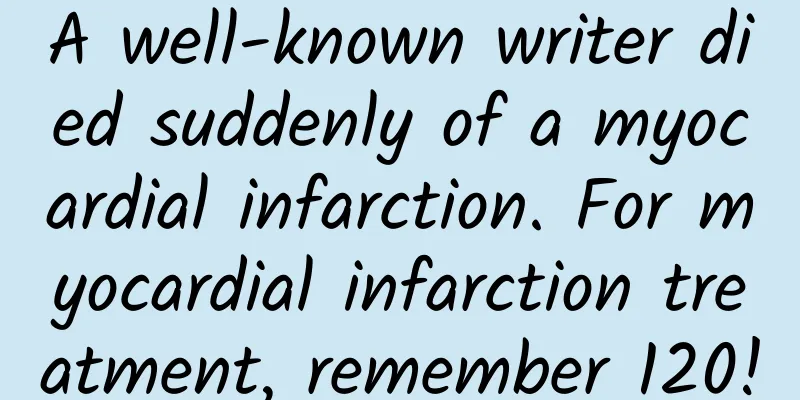A well-known writer died suddenly of a myocardial infarction. For myocardial infarction treatment, remember 120!

|
According to a message posted on Xinjiang Weibo, Mr. Zhou Tao, a famous Chinese writer, died of a sudden heart attack in Urumqi at 1:30 p.m. yesterday. The main symptom of acute myocardial infarction is angina pectoris, which is the sudden onset of chest pain or the sudden aggravation of existing angina pectoris. The pain is mainly concentrated behind the sternum and in front of the heart, in a palm-sized area, often manifested as squeezing pain, unbearable pain, often accompanied by sweating and a sense of impending death, often radiating to the left shoulder, the inner side of the left arm to the ring finger and little finger, or to the neck, pharynx or mandible. Rest and sublingual nitroglycerin generally cannot relieve the pain. Source: Tuchong Creative A small number of patients do not experience pain, but develop critical conditions such as shock or heart failure at the beginning. The basic cause of acute myocardial infarction is coronary atherosclerosis, on which plaque rupture and thrombosis occur, leading to acute occlusion of one or more blood vessels, which lasts for 20-30 minutes or more, i.e. myocardial infarction occurs. In the face of a threatening heart attack, to increase the chances of successful treatment, we must remember two 120s: First 120: 120 emergency call If someone around you suddenly has an acute myocardial infarction, you should stay calm first. If you have no experience, do not blindly rescue them, otherwise you may end up doing more harm than good. Dial 120 immediately, keep the patient in a comfortable position, comfort the patient, eliminate their tension and anxiety, and wait for rescue. Source: Tuchong Creative When you call 120 emergency number, you may encounter two situations: 1. When you are away from home, you can dial 120 directly on your mobile phone to connect to the local emergency center. 2. If you are not in another place, or if you use a landline to call an emergency center in another place (for example, if you want to call 120 in the provincial capital to be transferred to another hospital when you are in a county hospital), you need to dial the area code before 120. What you need to make clear after dialing 120: 1. Tell the patient’s address clearly so that the ambulance can arrive at the scene as quickly as possible. 2. Explain the condition and surrounding environment clearly. If your mind goes blank and you don't know what to say, just listen carefully and answer the dispatcher's questions without rushing to speak or repeating the same thing; Some cities are equipped with advanced dispatching systems (such as MPDS). The dispatchers will ask about the patient's condition in detail to achieve the purpose of hierarchical dispatch and on-site guidance. At this time, people should not think the dispatcher is too long-winded, but should actively cooperate in answering; remember, unless the dispatcher prompts you, never hang up the phone before the dispatcher . Finally, after the ambulance is dispatched, the emergency personnel may contact the person in need of help as soon as possible, so people should keep the communication open after hanging up the phone, and do not rush to contact family members or insurance companies, etc. If conditions permit, someone should be sent to the gate of the community or a conspicuous location to pick up the car. The second 120: golden time "120 minutes" The "golden time" for treating acute myocardial infarction is the first 120 minutes of onset. During this time, if the blocked blood vessels can be opened in time and the blood supply to the myocardium can be restored, most of the myocardium can be spared from necrosis and be reborn. Therefore, in treating acute myocardial infarction, we must race against time. The longer we delay, the more necrotic myocardium will die and the higher the mortality rate will be. According to statistics, if the blocked blood vessels can be opened within 60 minutes after the onset of a heart attack, the patient's mortality rate will be only 1%. However, if the blocked blood vessels are opened within 6 hours after the onset of the disease, the patient's mortality rate will soar to over 6%. At this time, as someone close to the patient, you must listen to the doctor's advice and don't hesitate, otherwise you will miss the best time for treatment and regret it. Source: Popular Science China Comprehensive People's Daily Online, China News Service, Wuhan University Tongren Hospital, etc. |
>>: Science illustration | Adventures at the CIIE! These high-tech products are so cool
Recommend
How does the public account’s reading volume come from?
Before answering this question, you should think ...
How to write a reliable community operation plan? The experts will teach you step by step!
Community operation is a complete commercial mark...
You must be kidding! How can dolphins run to the Mekong River? Aren’t they in the sea?
In the southeast of China's Qinghai-Tibet Pla...
Oceans are turning into deserts! How can we avoid the destruction of fisheries under climate change?
In recent years, climate change has led to the fr...
Are you still missing an ecosystem to become a “great” Internet company?
Is it reliable for startups to build their own ec...
How much do you know about the jokes in the Spring Festival Gala? Come and understand the stories that have been forgotten for thousands of years
The tadpole wishes you a happy new year! Did ever...
Dong Mingzhu: If we hadn't offended those people, Gree wouldn't be where it is today
Dong Mingzhu’s famous quotes and stories are alw...
"Transparent Earth" black technology: Using seismic waves to perform CT scans on the Earth
Major events on Earth are often related to its in...
Scene language - the cornerstone of VR's long-term development
According to foreign media reports, Manick Bhan, ...
This formula teaches you how to create popular screen-sweeping cases!
On the Internet, we should regard advertising con...
SEM bidding promotion account building
Paid bidding promotion has always been an importa...
Is the cold winter coming for mobile phone manufacturers? Mobile phone shipments fell last month, down 34.1%
Several major domestic mobile phone manufacturers...
How to set keywords for iOS APP titles and find the right length and keywords
Today’s article is about the length of iOS APP na...
How can we quickly improve the weight of the website? Look at how he got a weight of 4 with just one article!
Many friends who do website optimization and SEO ...
A creative sharing of industry information flow advertising that you absolutely cannot miss
The general workflow of daily information flow ad...





![[Yi Dian News] Three killer skills and three traps for content operations!](/upload/images/67cc377aab330.webp)



